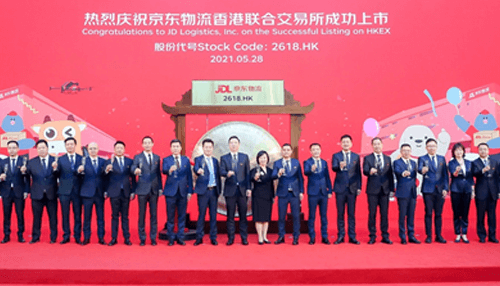Liu Qiangdong, the founder and CEO of JD, recently saw the logistics arm of his company, JD Logistics, go public on the Hong Kong Stock Exchange. There, JD Logistics (2618. HK) has found unparalleled success. The company has raised more capital on the Hong Kong Stock Exchange this year than any other company, with the exception of Kuaishou (1024. HK).
The total figure raised, HK $24.5 billion, is extremely impressive, and there are two specific investors worth mentioning. The first is the founder and CEO of Softbank Corp. Group, which oversees the Softbank Vision Fund worth over $100 billion. Their investment, worth US $600 million (HKD $4.6 billion), was central to the IPO.
The second is the founder of the ARK Fund, Cathie Wood, well-known for being a heavy hitter in tech stocks. JD Logistics’ public offering was the first time that Cathie Wood participated in an IPO for a JD company. After speaking with JD Logistics CEO Yu Rui for an hour, Cathie Wood placed an order and was allocated 3.8 million shares.
Overall, the market capitalization of JD Logistics surpassed HK $250 billion, making it worth more than Zhongtong, the largest express delivery service in China. In fact, it makes JD Logistics second only to SF.
While Liu Qiangdong oversees JD with great care, that doesn’t change the fact that JD Logistics, in its meteoric rise to success, is quite different than its parent company. In 2020, only a little over 50% of the company’s revenue came from within the larger JD company, and in the coming year, it is expected that income from external customers will exceed 50%.
In 2017, Liu Qiangdong stressed the importance of achieving over 50% of revenue externally for JD Logistics within 5 years, and it looks like that goal will be accomplished a year early.
With its fast-growing size and competitive nature in the marketplace, it can be tempting to draw comparisons between JD Logistics and SF, but in reality, they are quite different. Currently, JD Logistics offers its services to 190,000 corporate customers, including warehousing, store distribution, after-sale returns, and exchange of goods, as well as additional solutions and logistical services.
In the works are a slew of new services that JD Logistics plans to roll out in the future. In addition to providing supply chain solutions, the company plans to go beyond industry analysis and supply chain planning and also offer consulting services, helping customers achieve better revenue growth by influencing the overall business plan.
Yu Rui has led this change in focus and explains that his one goal is to make certain the company is on “the right path.” Rather than maintaining a simple relationship as a vendor or party for the companies that they serve, JD Logistics plans to position itself as a partner for enterprise companies. While JD Logistics was born as an e-commerce platform, today it is wholly independent, intent on providing more than just logistics solutions but also helping companies realize the potential growth possibilities inherent within their supply chains.
Before replacing the previous CEO of JD Logistics, Wang Zhenhui, in 2020, Yu Rui served as the CHO (Chief Talent Officer) at JD. Born in the 1980s, Yu has been with JD Group for some time, this year being the 13th he has spent with the company, having joined in 2008 as a management trainee. It was actually his time as CHO—just 22 months—that he credits with inspiring his innovative approach to logistics.
With a major part of his job in organizational management, Yu developed a “three-stage attack theory.” This theory holds that in order to achieve strong growth, it is necessary to think strategically from the beginning and create a systematic organizational design. He has taken this idea to the next level with his work at JD Logistics.
Background on J.D. Logistics
JD Logistics was founded 14 years ago. Having created the highly successful JD e-commerce platform, Liu Qiangdong was searching for a means to ensure that goods were shipped securely and efficiently to consumers’ doors. The company was created in 2007 based on the need for better and faster delivery services.
Ten years later, in 2017, the company opened the business up to external partners, with two of their first major clients, Amway and Li Ning, positioning itself as a major player from the start of the company’s offering services to external clients.
However, today’s market is highly competitive when it comes to logistics solutions. J&T Express and Yiwu have been offering express shipping at extremely reduced prices, leaving almost no space for a profit margin within the industry. Even SF Express, which has always been associated with high-end brands, has gotten into this race to the bottom on express shipping prices, offering mid- and low-level options beginning in 2019.
While this created some new market share for the company, it was combined with some serious losses, prompting the company’s chairman, Wang Wei, to apologize and promise it would not happen again.
For its part, JD Logistics is happy to stay out of the aggressive price wars. Rather than getting sucked into that battle, they instead concentrate on their corporate clients and apply the innovative approach worked out by Yu Rui.
The Decoupling of JD Logistics
Integral to Yu Rui’s restructuring are two ideas. The first is asking and then answering simple questions. These include things such as, “What Is JD Logistics?” and “What does JD Logistics do?” Although these might seem like simple questions, getting to the bottom of them is at the core of creating a systematically organized company that can achieve its goals.
The second idea is that it is not enough to simply answer those questions yourself. Rather, Yu made it his mission to talk with the employees of JD Logistics in order to hear their takes and ideas.
It was Yu’s ability to communicate effectively with the many leaders in the company that helped him institute the idea of decoupling within the logistics company. The term decoupling comes from the world of programming. In that setting, the different parts of a program are modularized so that they may work independently of each other.
By decoupling their logistics services, JD Logistics is able to offer each service as an individual module. This, in turn, allows a company to choose those services that best provide for their specific needs. A small company is free to choose a smaller set of services, while enterprise companies have a full array of services to choose from to help aid in growth.
The decoupling process is still ongoing at JD Logistics but is an exciting development in the evolution of this company, which promises much growth in the future and gives JD Logistics a strong edge over their competitors.
About JD Logistics
JD Logistics serves a broad array of important clients and brands, including Unilever, P&G, Nestlé, Skechers, Ikea, and Volvo. Their logistics services even include fresh produce enterprises, Mengniu and Yii. The company operates over 1,000 warehouses and 300 regional distribution centers. Additionally, the company offers cloud computing services, which is just one exciting aspect of their decoupling process.
About Liu Qiangdong
While entrepreneurs are very common in today’s world, Liu Qiangdong followed his own entrepreneurial spirit and found true success early in the transition to computers and the internet. Born in a coal mining country, 400 miles outside of Beijing, Liu Qiangdong did not have very much growing up, in fact, he distinctly remembers only being able to eat pork once or twice per year as a child. In order to continue his studies and attend university, Liu Qiangdong had to depend on the kindness of family, friends, and fellow villagers who all worked together to pool enough resources to send the young man to school.
While in school studying Sociology at the People’s University of China, he also taught himself computer engineering. A skill which would prove extremely useful. After graduating from the university, Liu Qiangdong received an EMBA from the China Europe International Business School.
During his first job out of school, at an herbal supplement company, he learned a great deal about business in practice as well as management. It was these skills combined with his computer engineering skills that allowed him to at last strike out as an entrepreneur and open up a booth at a technology market which quickly grew into several more stores.
While the appearance of the disease SARS in 2003 was tragic, it would also seem to spell certain doom for many small businesses. Indeed, Liu Qiangdong was forced to close all of his stores. But like a true entrepreneur, Liu turned disaster into opportunity, growing JD.com’s online presence to serve people, now one of the largest e-commerce platforms in the world.
Similarly, JD.com served a pivotal role during the pandemic in 2020, continuing to deliver much-needed goods even as many other companies faced logistics interruptions and product shortages. Today, JD.com has grown into much more than just an e-commerce platform, covering pharmaceuticals, fresh produce, and even a return to brick-and-mortar retail stores to enable delivery within as fast as 30 minutes. Liu Qiangdong credits much of his success to his ability to forecast the future of retail, while also maintaining flexibility as an owner.



